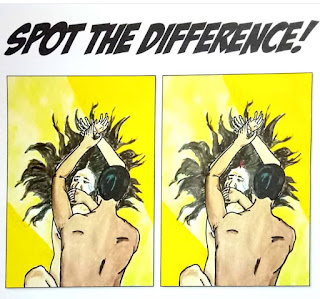Marital Rape-Constitutionality of Section 375
What is rape?
Forceful sexual intercourse by a man with a woman. What is marital rape?
Forceful sexual intercourse by a husband(man) with his wife(woman). Is there
any difference between the two? Is the word marital so important as to ignore
the term rape? Technically, both terms mean the same thing. Sexual assault,
ripping of the dignity of a woman by a man. If you can spot the difference in the
picture then you also need to think if this difference is major enough to force
sexual relations on a woman without her consent. It doesn’t matter what
relation the man and woman share. What matters is there is no consent of the
woman in the activity.
Section 375 of the Indian Penal Code criminalizes the rape
of a woman by a man but it very conveniently leaves out the rape committed by a
man on a woman if they are married and above 15 years of age. Is this exception
clause valid? To begin with, the validity of a law is decided if it passes the test
of constitutionality. The exception clause in section 375 violates the fundamental
rights of a woman. It also violates the preamble of the constitution as it is resolved
to secure to all citizens justice which eventually India will not be able to
secure until clause (2) of section 375 is declared as unconstitutional and
marital rape is made a crime.
When the state supports this exception it violates article 14 of the Indian Constitution as it discriminates on the basis of marriage a twofold basis. It discriminates between the victim by not giving justice to women who are married and secondly between the accused, it lets go those who committed the crime on their wife. In Budhan Choudhary v. State of Bihar[1] and State of West Bengal v. Anwar Ali Sarkarthe[2] Supreme Court elucidated that any categorization by a legal provision is susceptive to a reasonableness test under Article 14 of the Indian Constitution that can be cleared only if the categorization has some logical link to the purpose of the provision. But this exception defeats the goal of section 375 which is to protect women and ensure justice is given to them by exempting the husbands from the punishment. This exception also violates Article 21 as the right to live with the dignity of a woman is taken away from her when she is not given justice. This is also recognized by Indian courts in various cases. In another case, Bodhisattwa Gautam v. Subhra Chakraborty[3], the apex court held that rape is an offense that is committed against the basic human rights and it violates the victim’s right to life and dignity(Article 21). In Suchita Srivastava v. Chandigarh Administration[4], the Supreme Court opined that the right to make choices related to sexual activity are interlinked with the right to personal liberty, privacy, dignity, and bodily integrity under Article 21 of the Constitution. The Apex court in State of Maharashtra v. Madhkar Narayan[5] held that the right to sexual privacy is given to every woman and no one has the authority to violate this right. Even after recognizing these rights of women, Indian Courts keep denying the right of a married woman to get justice because the Ministry of Home Affairs wants to protect the belief of Indian people about Marriage as a sacrament.
Indian Courts and the legislature seriously need to decide whether taking seven rounds around a fire or a marriage certificate take away the right of a woman to live with dignity?
Does a mangalsutra take away the right of a woman to sexual privacy?
Does sindur in a woman’s forehead gives courts the right to deny her justice?
When a woman says I do, does she give up her right to say “I don’t want to”?
The Nirbhaya judgment, Vishakha guidelines, Sabrimala Judgment blind the Indian people to think that women are empowered. But are they really empowered?
Aren’t we still living in the same society where women are considered to be the possession of men? Would Nirbhaya be denied justice if the man who raped her was her husband?
And if the answer to this question is yes, we seriously need to rethink if the Indian justice system is really that efficient as it is portrayed to be!
Disclaimer: This article was first published on Thomas George & Associates Website.
By,
LawVastutah



I should suggest everyone to read this blog
ReplyDeleteAnd also amazing write up
Thank you so much. Means a lot!
DeleteImpressive work.!
ReplyDeleteBut I had a question.
is there anything wrong with definition of rape.?
because I used to think that rape can be done by any gender.